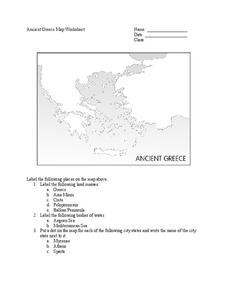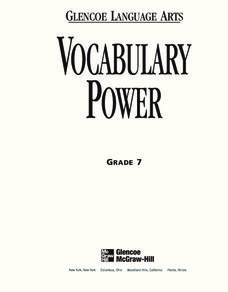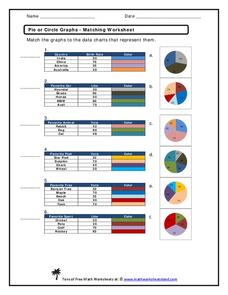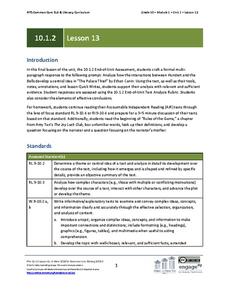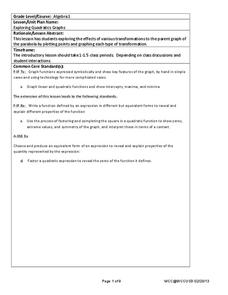Centre for Clinical Interventions
Social Skills Treatment Programme
Even though they may not be tested on standardized assessments, social skills are vital for students to develop during their years in school. Through a series of discussions, activities, and role-playing exercises,...
SFPOnline
States of Matter Worksheet
Young scientists get to the heart of the matter as they complete this worksheet on the properties of solids, liquids, and gases.
University of Texas
Heat Transfer and Energy Balance
Learn about conduction, convection, and radiation with an illustrative presentation. It includes slides about atmospheric movement and how it affects the climate, solar radiation, and how latent heat can form storms.
Gallantsbiocorner.com
Cell Organelles
Young scientists take a trip into the microscopic world of cellular biology with this practice exercise. Given pictures of different organelles, students must correctly identify specific parts of each cellular structure to demonstrate...
Federal Reserve Bank
What Really Caused the Great Depression?
Falling wages. Rising unemployment. Falling prices. Sound familiar? Young economists look at the role the US banking system had in causing the Great Depression.
Curated OER
Ancient Greece Map Worksheet
Since the beginning of time, geography has shaped the development of human civilization, and ancient Greece is no exception. This worksheet supports young historians with exploring this relationship as they first identify key land...
Have Fun Teaching
Where Am I? (15)
Guess the setting in a series of reading passages that allow learners to make inferences. Five short descriptions prompt kids to match one of four settings, based on context clues.
Novelinks
Nightjohn: Bloom's Taxonomy Questions
After completing Nightjohn, Gary Paulsen's young adult novel about slavery set shortly before the Civil War, readers respond to a series of questions crafted to reflect Bloom's taxonomy.
Curated OER
Print & Go ESL
Improve reading comprehension with a set of ESL worksheets. Kids read through various passages, note which facts are true or false, mark their opinion on two statements, and write a short reply based on a writing prompt.
Houghton Mifflin Harcourt
Down on the Farm: Extra Support Lessons (Theme 8)
Chants, rhymes, practice pages, picture, word, and punctation cards provide extra support for reading high-frequency words, substituting, blending, segmenting, and identifying phonemes in this Down on the Farm themed unit.
McGraw Hill
Vocabulary Power
Augment your language arts units with a set of vocabulary worksheets. The packet is an excellent support to your vocabulary instruction that covers a variety of skills, including context clues, Greek and Latin roots, reference materials,...
K5 Learning
Ann and Frank
Challenge your third and fourth graders to look deeply into a text with a reading comprehension activity. After learners finish the short passage, they answer four questions that range in levels of difficulty and analysis.
K5 Learning
Saving the Birds
Learn about the kindness and strength of Abraham Lincoln with a reading comprehension activity. After third and fourth graders read a short story about Lincoln saving a family of robins, they answer four questions about the plot and...
EngageNY
Describing the Center of a Distribution
So the mean is not always the best center? By working through this exploratory activity, the class comes to realize that depending upon the shape of a distribution, different centers should be chosen. Learners continue to explore...
Math Worksheets Land
Pie or Circle Graphs - Matching Worksheet
It's one thing to be able to read a pie graph, but it's another to analyze a pie graph and match it to its data table. Use a multiple choice worksheet when challenging learners to practice this skill. With six...
EngageNY
Grade 10 ELA Module 1: Unit 2, Lesson 13
To conclude their study of Ethan Canin’s short story “The Palace Thief,” class members use their notes and annotations to craft an expository essay response to the prompt, "Analyze how the interactions between Hundert and the Bells...
E Reading Worksheets
Tone Worksheet 5
A speaker's attitude toward his or her subject matter determines the tone of a piece of literature. Interpret the tone of four different poems, as well as their meanings, with supporting textual details.
Curated OER
How the Chipmunk Got Its Stripes: a Legend of the Iroquois
Have you ever wondered about a chipmunk's stripes? Read a short passage featuring the Iroquois legend about the chipmunk and his stripes, and answer five comprehension questions about the plot, the theme, and the unfamiliar...
Alberta Learning
Equivalent Fractions: Activity Sheet
Provide learners with practice for identifying equivalent fractions. The first worksheet contains 15 problems that instruct pupils to name fractions based on visuals, and to find missing parts to equivalent fractions. In the second...
Curated OER
The Old Man and the Sea: Narrative Essay
Finish a unit on Ernest Hemingway's The Old Man and the Sea with a narrative essay. Based on Santiago's harrowing adventures, the essay prompts readers to think about a time when they were faced with a challenge, overcame a...
InqueryPhysics
Interpreting Motion Graphs
Every movement in the world can be measured and even motionless objects can be significant indicators of movement. Focus on motion graphs that feature distance vs. time, speed vs. time, and positive and negative acceleration.
Pearson
The Chemical Context of Life
An educational presentation includes atoms, molecules, the four major elements, as well as neutrons and protons. Additionally, slides focus on atomic number, mass number, atomic weight, polar and nonpolar covalent bonding, ionic...
Virginia Department of Education
Animal Phyla and Plant Divisions
Searched hours for an activity that allows individuals the ability to use multiple resources to learn about both plant and animal kingdoms? This discussion and activity provide pupils with the ability to visualize each organism...
West Contra Costa Unified School District
Exploring Quadratics and Graphs
Young mathematicians first graph a series of quadratic equations, and then investigate how various parts of the equation change the graph of the function in a predictable way.







